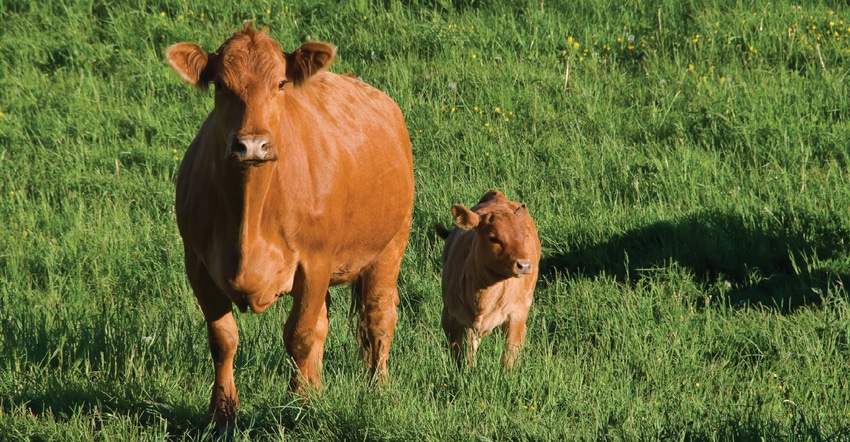New data suggests that vaccine choice may have a larger impact on reproductive efficiency than realized.
January 20, 2017

Sponsored Content
Getting back to the basics of reproduction
When considering the profitability of a cow/calf herd, reproductive efficiency is one of the most important factors influencing success. That’s why it’s critical — especially in today’s declining market — to ensure reproductive success for your clients.
“When it comes to getting back to the basics of reproductive performance, we really need to be able to evaluate herd performance measures, such as calves born per cows exposed,” said W. Mark Hilton, D.V.M., DABVP and Elanco technical consultant. “If we can evaluate these metrics, it helps us identify gaps in reproductive efficiency in clients’ herds.”
Implementing industry best practices, such as estrus synchronization (ES) and artificial insemination (AI), can help ensure a successful breeding program, but several other factors can also influence reproductive efficiency, from nutrition to health management. One factor — vaccine choice — may be impacting your clients’ reproductive efficiency more than you realize.
Vaccine impact on reproduction
Recent research at South Dakota State University demonstrates how the vaccine you may be recommending 30 days prior to breeding can impact reproductive performance.1 The trial was conducted on previously vaccinated cattle with known vaccination history from heifers to 13 years of age, comparing Vira Shield® (an inactivated vaccine) to Bovi-Shield® (a modified-live vaccine).1
“What surprised us when we looked at the modified-live versus the inactivated vaccine was the differences in AI conceptions between the two vaccines — inactivated having higher conception rates throughout the season compared to MLV,” said George Perry, Ph.D., Professor and Beef Reproductive Management Specialist, South Dakota State University.
The data show:1
Treatment of cows and heifers with Bovi-Shield during pre-breeding decreased pregnancy success compared to treatment with Vira Shield
Treatment with Bovi-Shield tended to reduce the percentage of cows that calved in the first 21 days of the calving season compared to Vira Shield
This decrease in calving percent remained over the entire calving season
“The results translated to calving results,” said Perry. “Cows that were bred earlier, calved earlier, which impacts weaning weights. After you get a late start, everything else is negatively impacted from a performance standpoint.”
Rethinking vaccine options for reproductive success
“If a producer’s focus is the same as a traditional cow/calf producer, where they’re not bringing in lots of outside animals, the question that comes from this data is, ‘Can I improve conception rates by switching to an inactivated vaccine?’” said Perry. “From what we have seen in this data, there is a benefit to that — 5 to 8% is the average difference in conception rates. Many producers think that’s a large enough increase to look into how they can get better AI conception rates.”
To protect their bottom lines, producers are constantly evaluating opportunities to improve reproductive parameters.
“This is new information and represents a change from traditional thinking,” said Hilton. “In the past, we didn’t know the impact of a vaccine on future estrus cycles. But now, we can use this data to consider the potential impact on our clients’ herds.”
Why choose Vira Shield?
Establishing lifetime immunity is critical in setting your clients up to win by preventing reproductive and respiratory diseases that can negatively impact performance. Vira Shield helps establish lifetime immunity by providing a complete line of flexible, safe and powerful inactivated vaccines that protect against up to 13 respiratory, reproductive and leptospirosis diseases.
“This data demonstrates that using Vira Shield 30 days before breeding provided improved reproductive performance compared to Bovi-Shield,” said Hilton. “It’s critical to evaluate your clients’ vaccine programs to ensure you’re helping them get the most out of their breeding program.”
To learn more, talk to your Elanco technical consultant or sales representative.
1Perry, G., Larimore, E., et al. 2016. “Influence of vaccination with an inactivated or modified-live viral reproductive vaccine on reproductive parameters in beef cows.” South Dakota State University.
All other trademarks are property of their respective owners.
Elanco®, Vira Shield® and the diagonal bar are owned or licensed by Eli Lilly and Company, its subsidiaries or affiliates.
© 2017 Eli Lilly and Company, its subsidiaries or affiliates. All rights reserved.
Nclth 4872-2 | USBBUVSH00017
About the Author(s)
You May Also Like



